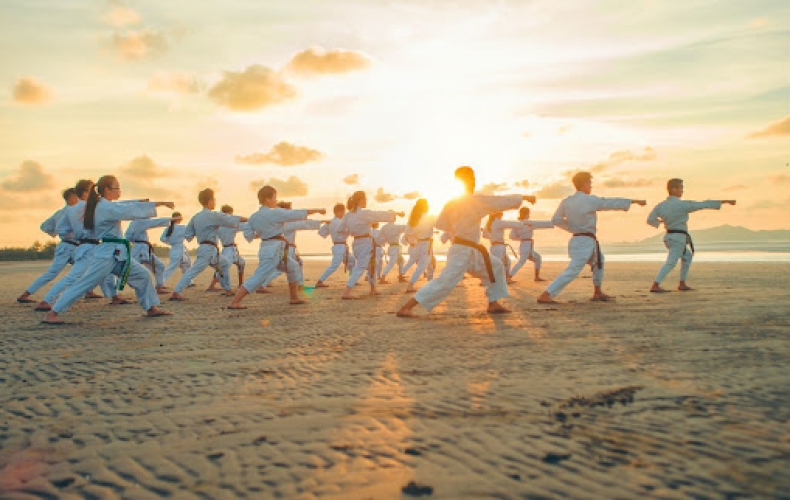Sports Participation Waiver for Martial Arts

Martial arts can be a high-impact, combative experience. Depending on the style of martial art (Jiu-Jitsu, Taekwondo, Karate, Judo, Muay Thai, etc.) there are plenty of different techniques and fighting styles to consider. Some styles won’t have as much of a focus on fighting, others will be centered around it. For any type of martial art and whatever the studio plans on teaching its students, it’s essential to be prepared for injury or confrontation with sports liability waivers for martial arts.
Martial arts sports participation waiver
Martial arts is a contact sport or a sport that focuses on self-defense and fighting. It’s common sense that there’s a risk of injury from bruises to broken bones. It’s not so different from the risk of other sports, such as soccer or hockey, but because martial arts is meant to be physical, and meant to train students to fight together, a waiver for sports activities is necessary.
A sports participation waiver specific to martial arts will cover the unique risks, possibilities, and scenarios as well as the more general ones. Because it’s a specialized sport, there will be clauses different from other sports waivers. But it’s still a sport, so many templates will be applicable to use as a starting point.
Why a sports waiver for martial arts studios is crucial
It’s a critical prerequisite to running any sport but for martial arts studio owners looking to secure their future and keep students and instructors safe, here’s what the waiver for sports activities can offer.
Student Responsibility
A sports liability waiver offers the transparency participants need to understand the full risks and scenarios that might take place. For any other sport, this is great. For martial arts, students are encouraged to take on responsibility for their actions in class. For example, in combative training, knowing the risks outlined in the sports waiver, students can choose to apply their training wisely with their fighting partners to ensure harm doesn’t come to them or others.
The sports waiver outlines what the risks are of participating in a martial arts class so students know what’s in their control to avoid. All students and instructors working together will create a safer environment.
Accidents and injuries do happen but in a martial arts class when there are many different levels of student training and practicing different techniques, instructors need to trust they’ll use the techniques they’ve learned properly to promote safety.
Informed decision-making
Martial arts classes are offered for all kinds of students: young children, adolescents, adults, and special needs on some occasions. The person signing the sports participation waiver won’t always be the person taking the class. Some people will sign for their dependents.
This means whoever signs can make an informed decision about whether or not their dependent is prepared to join the program. Some students or guardians might not feel ready to join a martial arts school after having reviewed the sports liability waiver and that lowers the risk of a high-risk participant joining.
Managing other events
Lots of martial arts studios will host other events, such as charity challenges, summer camps, tournaments, and more. A waiver for sports activities can help cover these extracurriculars or be easily edited to apply to different scenarios.
Charity challenges like Kick-A-Thon allow students, friends, and family to participate. A sports waiver can cover any injuries that might result in a pulled muscle or a fall from too many kicks.
Summer camps are filled with energized and active children. It’s not uncommon for someone to get an injury during summer camp with all of the activities and excitement. Sports participation waivers can apply to all of the activities the kids will be doing.
Whoever hosts away tournaments always has participants sign a waiver for sports activities to manage the risks. The same applies to martial arts studios that host their in-house tournaments. Sports liability waivers keep the business safe while students fight for first place.
Proper preparation
After having read and understood the sports waiver, many participants will find out how they can make their own experience safer with the suggestions or tips the waiver offers. If they’ll be participating in point fighting, they’ll realize they need to come prepared with a mouth guard and a set of foot pads, hand pads, and a helmet.
Not all martial arts classes involve hand-to-hand combat. Some focus just on routines, weapons, or individual techniques. It’s just as important for students to come to these classes understanding that the techniques they’re taught are meant to keep them safe. But as is the nature of the sport, bumps and bruises might happen.
This ensures students know the risks and what they need to protect while in class. With the proper equipment, the student is liable for any injuries they might sustain.
Professionalism
Any business that doesn’t require the signing of a sports participation waiver isn’t only a serious risk, but also unprofessional. The sports industry needs to leverage the security a sports waiver offers. Presenting a waiver to a student or guardian shows the reader they’re well-prepared, reliable, and understand the risks of the program.
However, if it’s a poorly developed sports liability waiver, it has the opposite effect. The sports waiver should cover every aspect of sports participation and at once ensure the business isn’t liable for injury as it prepares the reader on what’s expected of them.
Martial arts studios come in a wide range of businesses. Some are franchises, others are small businesses with a small circumference of students. One waiver plan might not apply to all businesses. That’s why Waiver Forever offers different options so businesses can choose the plan that makes the most sense to them. Check out what your Waiver Forever options are here.